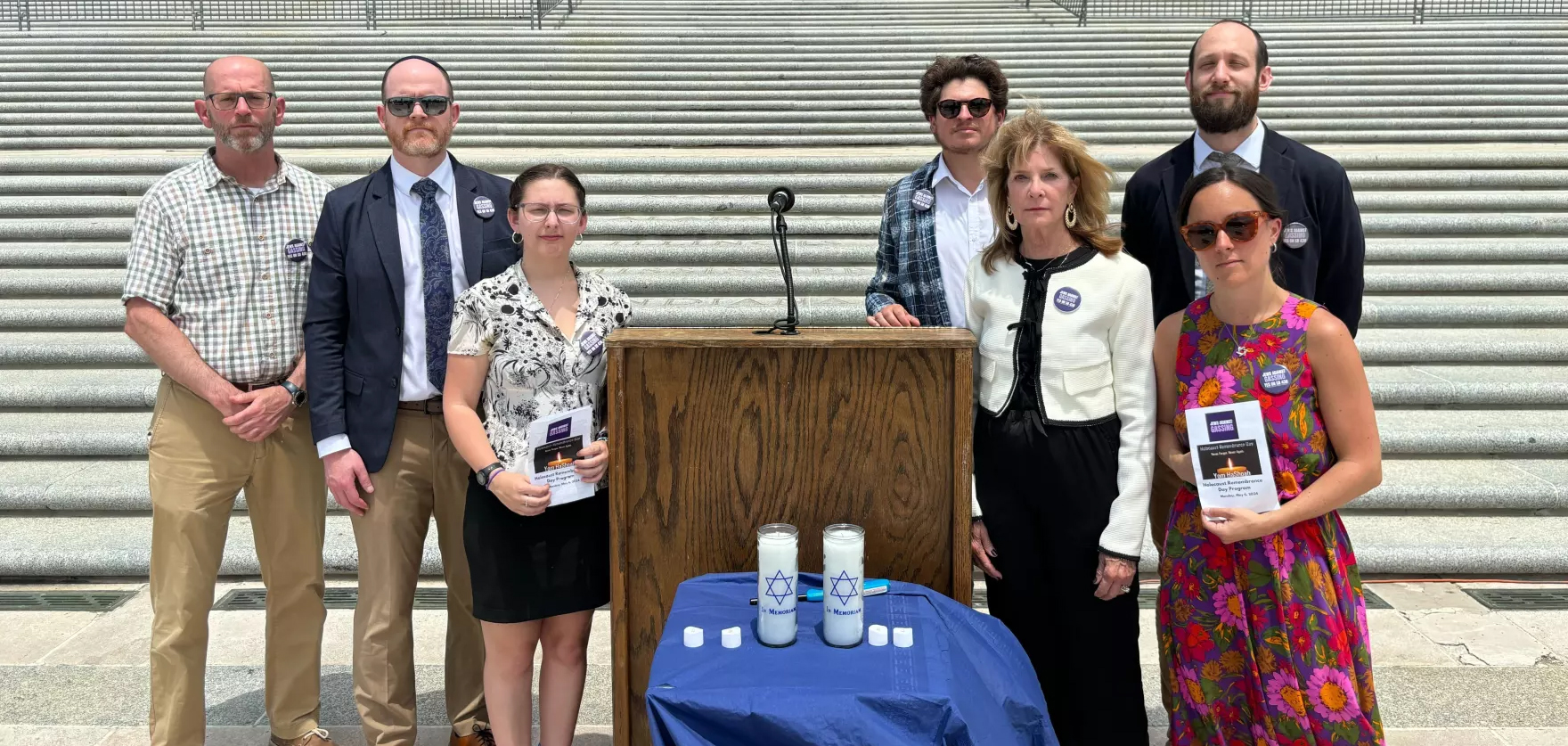Louisiana
Louisiana Jews form alliance to oppose gassing as means of execution – Baptist News Global

Louisiana’s Jewish community has formed an alliance committed to protesting and ultimately repealing a new state law allowing the use of gas as an execution method.
The Jews Against Gassing Coalition was formed after the March 5 passage of House Bill 6, which added the electric chair and nitrogen hypoxia as alternatives to lethal injection for Death Row inmates.
The group gathered May 6 at the state Capitol in Baton Rouge to observe Yom HaShoah, or Holocaust Memorial Day, and to urge legislative support for a pending bill to remove gas as an execution method in Louisiana.
Phil Kaplan
“It is unfortunate that we need to be hosting this event on the Capitol steps today. But it is necessary, on the same day we remember past atrocities, to speak out to prevent the state from utilizing a means of execution that evokes memories of the method that was used to kill so many of our ancestors,” said Rabbi Phil Kaplan of Congregation Beth Israel in New Orleans.
“The use of poison gas for state-sanctioned execution unmistakably and immediately evokes for millions of American Jews horrific memories of the depravities our ancestors suffered at the hands of Nazi Germany, where lethal gas as was used to mass murder our people.”
Nitrogen hypoxia made national and international headlines in January when Alabama became the first state known to execute a prisoner using the agent. Death penalty opponents around the world denounced Kenny Smith’s Jan. 25 execution as cruel, inhumane and experimental.
The state’s prediction Smith would quickly pass out after inhaling the nitrogen gas did not turn out to be the case, AL.com reported in a video: “Media witnesses saw that Ken Smith appeared to be conscious for several minutes after the gas began to flow before he proceeded to shake and writhe on that gurney for about 2 minutes. That 2 minutes of shaking and writhing on the gurney was followed by about 5 to 7 minutes of heavy breathing.”
The Equal Justice initiative pounced on the disparity between the state’s promise the gas would induce a quick and painless death and the fact it took Smith from 7:53 p.m. to 8:25 p.m. to die: “Mr. Smith clenched his fists and his legs shook. As Mr. Smith gasped for air, his body lifted against the restraints. Witnesses observed fluid inside of the mask. What witnesses observed last night are clear signs of distress and suffering.”
The United Nations swiftly condemned the execution as barbaric. “The use, for the first time in humans and on an experimental basis, of a method of execution that has been shown to cause suffering in animals is simply outrageous.”
Using Smith “as a human guinea pig to test a new method of execution amounted to unethical human experimentation and was nothing short of State-sanctioned torture,” the U.N. added. “The gruesome death inflicted on Smith is also likely to have caused extreme distress and suffering to his relatives.”
Smith devoted his last words to echo that sentiment and to reflect on the damage done to the state’s moral fabric, according to the federal Defender Services Office: “Tonight, Alabama caused humanity to take a step backward. … I’m leaving with love, peace and light. Thank you for supporting me, love all of you.”
“Tonight, Alabama caused humanity to take a step backward.
Religious groups swung into action in early March when Louisiana legislators, acting in special legislative session convened by Gov. Jeff Landry, voted to emulate Alabama’s use of nitrogen hypoxia. Leaders from a cross-section of faith organizations gathered on the Capitol steps to blast the legislation as “inexcusably cruel.”
And their voices were heard. Baton Rouge Public Radio recently reported the use of nitrogen hypoxia “is getting some pushback late in the legislative session.” Senate Bill 430, which would strike the use of gas from the state’s lineup of execution methods, passed out of committee unanimously in April.
The Jews Against Gassing Coalition ascribed the shift to legislators’ emerging awareness of the connection between gas and genocide.
“We realized after speaking to many legislators in the past few weeks that they didn’t realize how it would feel for us as Jews to add gassing as some method of execution,” said Jacqueline Stern, an executive board member with the Jewish Federation of Greater New Orleans. “They didn’t make the association with the Holocaust, but after it was brought up to them, it was undeniable and they understood our coalition’s perspective.”
Opposition to the use of nitrogen hypoxia for executions is rooted in the historical experience, moral teachings and commitment to justice of the Jewish community, said Aaron Bloch, director of Jewish multicultural and governmental affairs for the Jewish Federation of Greater New Orleans.
“The use of lethal gas in executions evokes painful memories of the Holocaust, where millions of Jews and others were murdered in gas chambers,” he explained. “And while we do not suggest comparisons to the atrocities of Nazi Germany under which millions of our relatives were murdered, still, we cannot imagine that Jewish communities anywhere can stand by while prisoners are executed in our names using any variation of that mechanism.”
Related articles:
Global condemnation falls on Alabama for experimental capital punishment method
Condemning Alabama for using an experimental drug to execute a prisoner misses the point, author warns

Louisiana
Louisiana’s MAGA governor went on 'weeklong jaunt' in Europe while hurricane hit his state

While Hurricane Beryl crossed into Louisiana as a tropical storm, Republican Governor Jeff Landry was on vacation in Europe, according to a new report.
Baton Rouge, Louisiana-based newspaper the Advocate reported Friday that Landry and his wife, Sharon were on a “weeklong jaunt” through Croatia, Greece and Italy when Beryl hit Louisiana, killing one person and damaging homes and businesses and leaving thousands without power. Beryl — which hit southeast Texas as a category 1 hurricane earlier this month, later moved east into the Bayou State and caused coastal flooding and wind speeds in excess of 60 miles per hour. A 31 year-old woman in Benton, Louisiana was killed when a tree fell on her home.
“All the governors I’m familiar with made a business to be around during hurricane season, especially when there was one in the Gulf,” Terry Ryder — who was an attorney for three former Louisiana governors — told the Advocate. “They were always completely engaged before, during and after a storm or a serious threat of a storm. You would not have seen them way out of the country.”
READ MORE: Experts alarmed as Louisiana gov gives himself control of state ethics board he’s in dispute with
While Landry reportedly told Lt. Gov. Billy Nungesser (R) about his European vacation in advance, he notably did not make a public announcement. Nungesser told the Advocate that he doesn’t “sleep during a hurricane ever since Katrina,” in reference to the 2005 storm that killed more than 1,500 Louisiana residents. He added that it was a “tough call” for Landry to decide postponing his vacation in light of the hurricane as it was approaching from the Caribbean.
“So many of them don’t affect us,” he said. “But if becomes a major threat, you have to be in a position to come back.”
Landry’s press secretary, Kate Kelly, told the publication via text message that the characterization of her boss as absent during a major emergency was unfair, and that Landry was plugged in with state emergency response officials throughout his vacation.
“It was not much of a vacation as he sprang into action with multiple calls a day with the FEMA director, local leaders, GOHSEP [Governor’s Office of Homeland Security and Emergency Preparedness], & State Police in order to monitor Hurricane Beryl,” Kelly said. “He issued a disaster declaration for affected parishes on July 9 and requested a Federal Emergency Disaster Declaration on July 10. Gov. Landry always puts Louisiana and her people first, and it’s disingenuous for this paper to try and imply otherwise — solely for clickbait.”
READ MORE: Ten Commandments governor declares no church-state separation in rough Fox News interview
Michael Steele, who is a spokesperson for GOHSEP, told the paper that “there was never a moment when the governor was out of communication” with emergency responders.
“GOHSEP was never activated beyond the first level of activation,” he said.
Landry’s European trip had reportedly been postponed more than once: The Covid-19 pandemic initially scuttled his plans to visit the continent, followed by the death of his mother-in-law and the 2023 gubernatorial race.
Click here to read the Advocate’s report in its entirety (subscription required).
READ MORE: Facts GOP gov should’ve looked up before signing Ten Commandments bill: constitutional lawyer
From Your Site Articles
Related Articles Around the Web
Louisiana
A Louisiana police officer was killed during a SWAT operation, officials say

BATON ROUGE, La. — A Louisiana police officer was killed this week during a SWAT operation, the Lafayette Police Department said Friday.
In a statement on its Facebook page, the department identified the officer killed as Senior Cpl. Segus Jolivette, a member of the Special Weapons and Tactics Team. The husband and father of five joined the department in November 2013 and had served as a school resource officer in the past.
The officer was killed during a SWAT operation Thursday in the small city of Jeanerette in southern Louisiana. Details about the situation leading up to Jolivette’s death were not immediately available.
Trooper Peggy Bourque, a spokesperson for the Louisiana State Police, told The Associated Press on Friday morning that a suspect “has been captured and is no longer a threat to the public.” Officials have not provided the name or details of the suspect.
Multiple police agencies and officials took to social media Thursday night to mourn the death of the officer.
“Today we lost one of our best in the line of duty,” Lafayette Parish Mayor-President Monique Blanco Boulet said in a written statement. “I offer my prayers, my sympathies and my support to his wife, his children, his parents, and his entire family. They are experiencing the most difficult and unimaginable kind of loss.”
Before joining the Lafayette department, Jolivette worked for the Opelousas Police Department. Lafayette police said Jolivette dedicated much of his free time supporting the Explorer Program, “helping Lafayette’s youth to gain a better understanding of law enforcement operations and the importance of relationship building in our community.”
“His legacy of bravery and dedication will be remembered and honored by all who knew him,” Lafayette police said in a statement.
——
Associated Press writers Kevin McGill in New Orleans and Jeff Martin in Atlanta contributed to this report.
Louisiana
Kamala Harris wins donations from Democratic voters across Louisiana

Kamala Harris’ nascent run for president has inspired voters across the state to donate to her — some of whom had never before given to a political campaign.
Harris, the vice president, is the likely Democratic presidential nominee after President Joe Biden quit the race on Sunday and endorsed her. Over the next 24 hours, her campaign reported a whopping $81 million in donations.
It’s unclear how many of those came from Louisianans. Such data is not yet available from the Federal Election Commission, and Harris’ campaign did not return an inquiry.
But over two dozen Louisianans said this week that they were among those who gave to her campaign. Some were relieved that Biden had dropped out after his disastrous debate performance June 27. Others were excited by Harris’ track record and thrilled by the possibility of the country’s first female president.
Helena Moreno, the president of the New Orleans City Council and a Democratic delegate, said Harris’ candidacy has energized Democrats.
“People throughout New Orleans…are constantly reaching out to me, to my office, (to ask) how they can get involved, what they can do to volunteer,” she said. “There is a very invigorated constituency.”
Louisiana’s Democratic National Committee delegates quickly lined up behind Harris after Biden endorsed her. The Tunica-Biloxi Tribe of Louisiana, which according to Open Secrets has given nearly $400,000 to Democratic groups and candidates during the current election cycle, also appears poised to back Harris.
“(Biden’s) administration has been a tremendous partner for us, and I am confident that a Harris Administration would continue that partnership,” Marshall Pierite, chairman of the Tunica-Biloxi Tribe, said in a statement. “Vice President Kamala Harris is just beginning her campaign, and as a delegate to the convention, I look forward to listening to ensure Indian Country’s needs are being met.”
Hoping for an alternative to Biden
Louisiana is deep red and will almost certainly give its electoral votes to Donald Trump, but that hasn’t dampened the excitement among voters eager to avoid a second Trump presidency.
Roland Darby, a 60-year-old teacher from the New Orleans area, said he was watching the news with his mother when they found out Biden had left the race.
“Within the hour of that announcement I actually got a text message asking for me to provide a donation (for Harris),” he said. “I had been getting that throughout this campaign season (and) I ignored it, but when I heard the announcement, I immediately donated without hesitation because I wanted to be a part of that.”
Darby is “terrified” by the prospect of another Trump presidency but was afraid of Biden’s chances, given his age and debate performance. With Harris, he feels hopeful again.
Darby also is excited that a biracial woman is within a grasp of the presidency.
“Being a Black man, any time you have a person of that prominence representing you and your culture, your race, there’s something about that that makes you invested,” he said.
‘I just hope more people donate to her’
Meanwhile, in Meraux, the news prompted another teacher, Bridget Derbyshire, to give to a campaign for the first time in her life.
“I like that she’s young, she’s energetic, she doesn’t mudsling, she I feel is someone who is going to get things done,” Derbyshire, 54, said of Harris, adding that the possibility of having the first woman president also motivated her.
Derbyshire said she does not vote based on political party but bases her decisions off the candidates. She was a registered Republican until 2018, when she switched her voter registration to Independent, she said.
Another first-time donor was Kevin Barnes, a 38-year-old from New Orleans who said he owns his own security company. For Barnes, it’s not Harris’ background but her qualifications that matter, he said. The vice president previously served as a U.S. senator and as California’s attorney general.
He gave $1,000, he said.
“It’s going to be an uphill battle for her. In order to really make her relevant she’s going to need money to run,” Barnes said. “I just hope more people donate to her.”
Other donors included Jason Petitjean, a 36-year-old physician from Covington, and Emily Rasch, a 27-year-old from Pearl River.
Bellah Bultron, a 20-year-old LSU student, said she gave $5 – what she could afford on her college budget.
Harris’ candidacy has excited her college friends, even some who are moderate or right-leaning.
Everyone is excited “to at the very least have another option,” Bultron said.
Where do bigger donors stand?
It’s unclear whether Harris can rely on support from some of the state’s biggest Democratic donors. Morris Bart, a trial attorney, declined comment through a spokesperson. His company, Morris Bart LLC, has given nearly $300,000 to Democratic groups and candidates during the 2024 election cycle, according to Open Secrets.
The Gordon McKernan Law Firm and MMR Group, an electrical contractor, did not provide comment.
McKernan’s group gave $150,000 to Napoleon PAC this election cycle, a political action committee that supports Democratic candidates, Open Secrets shows. The group also directly gave smaller donations to several Republican candidates, and one Democratic contender.
MMR Group has given tens of thousands of dollars both to Republican and Democratic groups and candidates.
Meanwhile, the state’s Black sororities and fraternities are working to mobilize voters — particularly voters of color — through outreach efforts.
Those organizations typically do not endorse political candidates because of their nonprofit status. But their outreach efforts could prove a boon to Harris, who was a member of Alpha Kappa Alpha sorority.
Brian Turner, the vice president of the Sigma Lambda chapter of the Black fraternity Alpha Phi Alpha, said it’s a critical time to vote, especially on issues that could impact communities of color, Turner said.
“We want to make sure that people understand the issues, understand candidate positions,” he said, while noting that the fraternity does not endorse specific candidates.
-

 World1 week ago
World1 week agoOne dead after car crashes into restaurant in Paris
-

 Midwest1 week ago
Midwest1 week agoMichigan rep posts video response to Stephen Colbert's joke about his RNC speech: 'Touché'
-

 News1 week ago
News1 week agoVideo: Young Republicans on Why Their Party Isn’t Reaching Gen Z (And What They Can Do About It)
-

 Movie Reviews1 week ago
Movie Reviews1 week agoMovie Review: A new generation drives into the storm in rousing ‘Twisters’
-

 News1 week ago
News1 week agoIn Milwaukee, Black Voters Struggle to Find a Home With Either Party
-

 Politics1 week ago
Politics1 week agoFox News Politics: The Call is Coming from Inside the House
-

 News1 week ago
News1 week agoVideo: J.D. Vance Accepts Vice-Presidential Nomination
-

 World1 week ago
World1 week agoTrump to take RNC stage for first speech since assassination attempt















